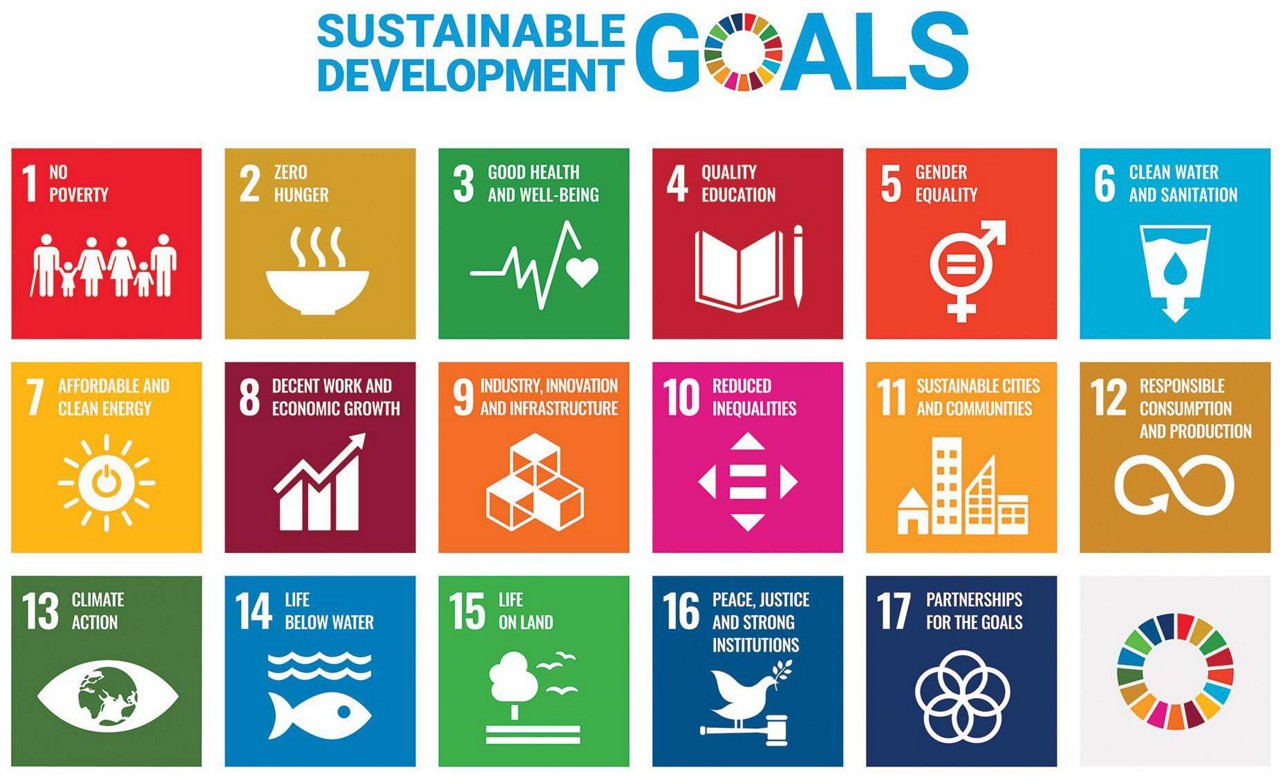Get the right experience for you. Please select your location and investor type.
IMPORTANT NEWS: Transition of investment management responsibilities
First Sentier Group, the global asset management organisation, has announced a strategic transition of Stewart Investors' investment management responsibilities to its affiliate investment team, FSSA Investment Managers, effective Friday, 14 November close of business EST.

Rainbow washing the SDGs away
The Sustainable Development Goals (SDGs) have been broadly embraced by financial institutions. This is a positive move, and timely too.
The 2019 Edelman Trust Barometer1 indicates that the finance industry remains the least trusted business sector and is often, quite rightly, blamed for failing to address the great social and environmental challenges of our time.
In this environment, the SDGs offer a unique opportunity, some might say life raft, to align the purpose of finance with globally agreed sustainable development objectives. The United Nations (UN) itself argues that finance must play a critical role in closing a funding a gap in developing countries, estimated to be USD2.5 – 3 trillion per year between now and 20302.
This shift is supported by client demand, with Morningstar reporting a ‘Record-Shattering Year for Sustainable Investing’3 in 2019. With this has come a proliferation of funds that claim to invest sustainably, with many linking their investment objectives to the SDGs. Indeed, even ‘mainstream’ investors, like large pension funds and sovereign (state-owned) wealth funds have sought to map their investments to the goals.
'Running hard on quicksand – investors are struggling to validate and articulate SDG contributions'
Balancing the positives...with the negatives
The embrace by investors of the SDGs is not without its issues and carries significant risks. Unlike other responsible investment approaches, the SDGs were not designed as a private investment framework, nor are there agreed disclosure requirements or minimum standards. To make matters worse, the information that investors rely on to make decisions related to the SDGs is even sketchier than it is for other environmental, social and governance (ESG) factors, with the Ethical Corporation4 and Oxfam5 among others finding that SDG reporting by companies is weak and given to ‘greenwashing’, or ‘rainbow washing’.
There are several issues we have seen with different external fund reporting:
- Lack of balance, where case studies of positive SDG impacts are not balanced with risks and issues the company faces.
- Lack of portfolio disclosure, so clients and stakeholders are left to rely on high level ESG metrics and case studies.
- Simplistic and overly-broad approaches to tagging company contributions which can lead to misaligned and inappropriate stock inclusions.
- A lack of information on the approach and processes, both where qualitative judgments are required or where quantitative approaches fail to acknowledge data issues and gaps.
Nestlé, for example, is a company we believe is moving in the right direction in terms of access to nutrition, supply chains and packaging, but readily acknowledge risks from bottled water, plastic packaging and responsible sourcing. We often say that there is no such thing as a perfect company, but too often we see the positives expressed without the negatives for large, complex and evolving companies like Nestlé.
It is one thing to have omissions from disclosures that are properly addressed through the investment process. However, we have also seen instances where companies are included in SDG labelled funds when we believe they do not deserve to be. For example, pharmaceutical companies like AbbVie who have faced criticism for drug pricing and rate poorly in the Access to Medicine Index6 across most areas. The company has also faced controversies over elaborate kickback schemes7 for doctors and engaged in extensive litigation to prevent competition from generics for their Humira drug, which is technically, although not practically, off-patent.
Companies like AbbVie are sometimes simplistically tagged with SDG 3 – Good Health and Well-being. However, as this example shows, it is important to look deeper at a company’s business practices.

Examples like these also underline the importance of focusing on the 174 targets rather than take a broad view on the 17 goals, which in some applications can capture the majority of companies. Even socially useful and ethical companies should not be tagged with SDGs if they do not in fact contribute to the underlying targets.
The critique in this article is not about individual fund’s investment choices, but rather the inability for clients and prospective clients to understand what choices are being made and why. Even well intended approaches in this regard risk a fund’s reputation and further reducing public confidence in the whole industry.
What can fix this problem?
We believe that a principles-based framework is required - one which can help improve the credibility of SDG-related claims while allowing for the diversity of reasonably held beliefs and approaches to sustainable investment.
To achieve this end, we have developed and started to apply principles for our own SDG claims. We believe these principles have broader application, both by asset owners wishing to test the claims made by asset managers, and asset managers wanting to ensure the credibility of their own products. The principles are as follows:
SDG claims should:
- Demonstrate a clear link to SDG targets, especially where developing countries are differentiated from developed.
- Be meaningful and relevant for the company (not corporate philanthropy) either as:
a. a revenue/growth driver
b. strategic initiative backed by research and development (R&D) and capital expenditure
c. a function of deep culture and ‘how they do things’ e.g. for gender equality targets
- Make a real and preferably recurring difference to target outcomes by being demonstrable (not necessarily measurable) and deliberate.
- Recognise and be transparent about negative impacts from the company, including contradictions and risks of perverse outcomes –with claims only being made where disclosure is balanced and comfort can be drawn that negatives are being addressed.
Additionally, investors should be clear about what type of contribution an investee company is making, recognising that not all directly to the SDG targets with companies noted as either providing:
- Direct contributions to targets
- Enabling/supporting activities
- Sustainable and socially useful products and services, but not directly relevant to a target
By extension, applying these principles would require full portfolio holdings disclosure.
Principles in practice - examples of how companies are contributing to sustainable development
Examples of companies we have so far categorised this way include, a Japanese drug store dispensary that has been the clear leader in distributing generic medications through a large retail network, making these medicines more accessible for rural and low-income populations. This is particularly important with Japan’s ageing population. We believe the company makes a direct contribution to:
SDG target 3.8: Achieve universal health coverage, including financial risk protection, access to quality essential health-care services and access to safe, effective, quality and affordable essential medicines and vaccines for all.
A US multi-physics engineering and software company is providing supporting activities which has created the world’s leading engineering and product design software. The company is supporting a move towards a circular economy (SDG 12.2 and 12.5) as its software virtually tests performance of products and processes, with the ability to evaluate energy efficiency, greenhouse gas emissions and water usage. The technology reduces development time 9x and overall product cost 4x. While we are concerned that their software is used by the defence and oil and gas industry, these represent relatively small proportions of revenue at around 1% each.
Lastly, an example of a company whose products are sustainable and socially useful, but not directly linked to an SDG target, is a Japanese baby-care company, which manufactures and distributes best-in-class infant feeding products, including bottles and breast pumps, but also health and hygiene products for the elderly.
In our attempts to apply these principles, we have developed a new microsite and interactive map that provides full portfolio disclosure and relevant SDGs across strategy holdings.
Standards for claims made about the SDGs across the industry must improve, lest trust be further eroded and the all-important real world impacts fail to materialise. Transparency is a critical feature of building trust, as is the ability to demonstrate that companies are making a meaningful and enduring impact on sustainable development through their core business activities and conduct. As we look to improve our own disclosure, we invite other investors to join us on this journey.
Source for company information: Stewart Investors investment team. For illustrative purposes only. Reference to the names of each company mentioned in this communication is merely for explaining the investment strategy, and should not be construed as investment advice or investment recommendation of those companies. Companies mentioned herein may or may not form part of the holdings of Stewart Investors. The Stewart Investors Sustainable Funds Group supports the Sustainable Development Goals (SDGs). The full list of SDGs can be found on the United Nations website.
Investment terms
View our list of investment terms to help you understand the terminology within this website.
Want to know more?
Important Information
This material is a financial promotion / marketing communication but is for general information purposes only. It does not constitute investment or financial advice and does not take into account any specific investment objectives, financial situation or needs. This is not an offer to provide asset management services, is not a recommendation or an offer or solicitation to buy, hold or sell any security or to execute any agreement for portfolio management or investment advisory services and this material has not been prepared in connection with any such offer. Before making any investment decision you should conduct your own due diligence and consider your individual investment needs, objectives and financial situation and read the relevant offering documents for details including the risk factors disclosure.
Any person who acts upon, or changes their investment position in reliance on, the information contained in these materials does so entirely at their own risk.
We have taken reasonable care to ensure that this material is accurate, current, and complete and fit for its intended purpose and audience as at the date of publication. No assurance is given or liability accepted regarding the accuracy, validity or completeness of this material.
To the extent this material contains any expression of opinion or forward-looking statements, such opinions and statements are based on assumptions, matters and sources believed to be true and reliable at the time of publication only. This material reflects the views of the individual writers only. Those views may change, may not prove to be valid and may not reflect the views of everyone at First Sentier Group.
Past performance is not indicative of future performance. All investment involves risks and the value of investments and the income from them may go down as well as up and you may not get back your original investment. Actual outcomes or results may differ materially from those discussed. Readers must not place undue reliance on forward-looking statements as there is no certainty that conditions current at the time of publication will continue.
References to specific securities (if any) are included for the purpose of illustration only and should not be construed as a recommendation to buy or sell the same. Any securities referenced may or may not form part of the holdings of First Sentier Group portfolios at a certain point in time, and the holdings may change over time.
References to comparative benchmarks or indices (if any) are for illustrative and comparison purposes only, may not be available for direct investment, are unmanaged, assume reinvestment of income, and have limitations when used for comparison or other purposes because they may have volatility, credit, or other material characteristics (such as number and types of securities) that are different from the funds managed by First Sentier Group.
Selling restrictions
Not all First Sentier Group products are available in all jurisdictions.
This material is neither directed at nor intended to be accessed by persons resident in, or citizens of any country, or types or categories of individual where to allow such access would be unlawful or where it would require any registration, filing, application for any licence or approval or other steps to be taken by First Sentier Group in order to comply with local laws or regulatory requirements in such country.
About First Sentier Group
References to ‘we’, ‘us’ or ‘our’ are references to First Sentier Group, a global asset management business which is ultimately owned by Mitsubishi UFJ Financial Group (MUFG). Certain of our investment teams operate under the trading names AlbaCore Capital Group, First Sentier Investors, FSSA Investment Managers, Stewart Investors and RQI Investors all of which are part of the First Sentier Group. RQI branded strategies, investment products and services are not available in Germany.
This material may not be copied or reproduced in whole or in part, and in any form or by any means circulated without the prior written consent of First Sentier Group.
We communicate and conduct business through different legal entities in different locations. This material is communicated in:
- Australia and New Zealand by First Sentier Investors (Australia) IM Ltd, authorised and regulated in Australia by the Australian Securities and Investments Commission (AFSL 289017; ABN 89 114 194311)
- European Economic Area by First Sentier Investors (Ireland) Limited, authorised and regulated in
- Ireland by the Central Bank of Ireland (CBI reg no. C182306; reg office 70 Sir John Rogerson’s Quay, Dublin 2, Ireland; reg company no. 629188)
- Hong Kong by First Sentier Investors (Hong Kong) Limited and has not been reviewed by the Securities & Futures Commission in Hong Kong. First Sentier Group, First Sentier Investors, FSSA Investment Managers, Stewart Investors, RQI Investors and Igneo Infrastructure Partners are the business names of First Sentier Investors (Hong Kong) Limited.
- Singapore by First Sentier Investors (Singapore) (reg company no. 196900420D) and this advertisement or material has not been reviewed by the Monetary Authority of Singapore. First Sentier Group (registration number 53507290B), First Sentier Investors (registration number 53236800B), FSSA Investment Managers (registration number 53314080C), Stewart Investors (registration number 53310114W), RQI Investors (registration number 53472532E) and Igneo Infrastructure Partners (registration number 53447928J) are the business names of First Sentier Investors (Singapore).
- United Kingdom by First Sentier Investors (UK) Funds Limited, authorised and regulated by the Financial Conduct Authority (reg. no. 2294743; reg office Finsbury Circus House, 15 Finsbury Circus, London EC2M 7EB)
- United States by First Sentier Investors (US) LLC, registered with the Securities Exchange Commission (SEC# 801-93167).
- other jurisdictions, where this document may lawfully be issued, by First Sentier Investors International IM Limited, authorised and regulated in the UK by the Financial Conduct Authority (FCA ref no. 122512; Registered office: 23 St. Andrew Square, Edinburgh, EH2 1BB; Company no. SC079063).
To the extent permitted by law, MUFG and its subsidiaries are not liable for any loss or damage as a result of reliance on any statement or information contained in this document. Neither MUFG nor any of its subsidiaries guarantee the performance of any investment products referred to in this document or the repayment of capital. Any investments referred to are not deposits or other liabilities of MUFG or its subsidiaries, and are subject to investment risk, including loss of income and capital invested.
© First Sentier Group


